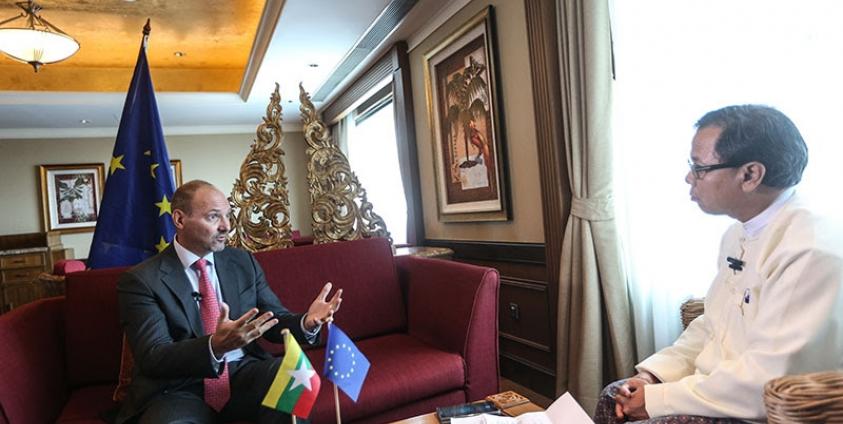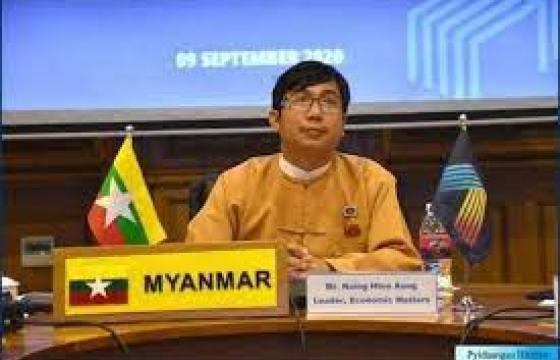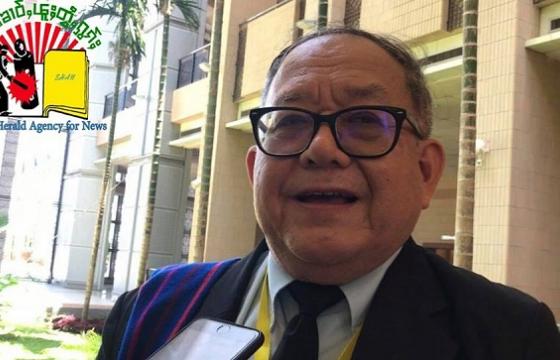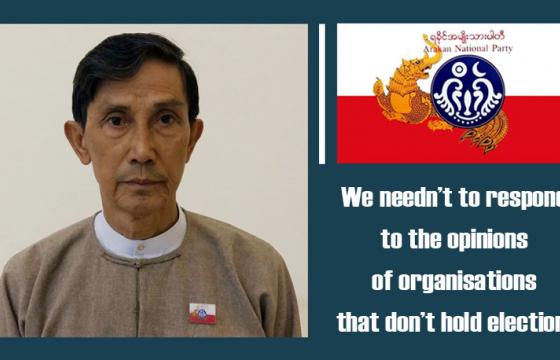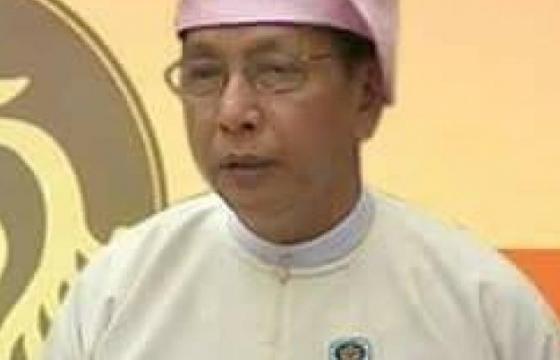European Union Ambassador Roland Kobia is upbeat about prospects of stepped up engagement between the EU and Myanmar following the new Myanmar government coming to power.
In the following interview conducted recently with Mizzima Editor-in-Chief SoeMyint, EU Ambassador Kobia talks about engagement, trade and investment, the peace process, and the development of Myanmar.
The 28 European Union foreign ministers recently adopted a new strategy for the EU relations with Myanmar. Can you tell us more about this new EU strategy on Myanmar? What are the changes or what are the key areas?
The whole idea was to have a new strategy very early into the new administration. We wanted to do this at the very beginning to show our political commitment. The new strategy is meant to be a strong message of support. The EU is here to assist Myanmar in a constructive way. We also wanted to reiterate our commitment to key areas of EU support: the peace process, development, human rights and economic growth and trade.
In certain areas we are proposing a paradigm shift. One area is notably the military cooperation. The military continues to be a very important actor in Myanmar. It is sitting in parliament, holds ministerial portfolios, is involved in politics and the economy. We would like to engage more with the military and share our experiences. In Europe, we have had several military regimes not too long ago and those countries then moved from military regimes to civilian governments. Today, the national armies under civilian control in Europe are well respected, proud and modern armies with state of the art equipment. They have an important role in society, they are there to ensure sovereignty and independence, and defend the people; but they have changed in the way of operating in our countries. We would like to engage in more dialogue with the Myanmar military about what could be a new vision for Myanmar. We propose to talk about the role of the military in a modern democracy.
The strategy also introduces the possibility to change the modality of our development cooperation. We are currently discussing ways to complement our classic aid channels where you engage through projects that are implemented by NGOs or other international partners. Another possibility is to transfer European funds directly to the national Myanmar treasury.
To the government?
Yes, to the government, onto the national treasury account. This is called budget support. On the one hand it improves the government's cash flow, and on the other hand it enables Myanmar to be in the driving seat, to develop their own policies. The EU believes in the principle of local ownership. That is why we are considering this possibility and have begun discussing it with the Myanmar government. There will be an accompanying framework to ensure the money is well used, in the way and for the purpose we agree upon. The member states of the European Union need to agree and if we successfully conclude these negotiations, around a fifth of the EU's development envelope (of a total of 688 million EUR) would be given directly to Myanmar for the country to lead their own policies in social sectors. We are targeting education and health as priority sectors, because these are the areas where the population expects to see very rapid improvements. The education and health sectors are also those that have the most immediate effect on the quality of life of the people.
Budget support is one of the instruments to help the government to deliver quicker on the peoples' expectations and hence show that democratic changes will lead to concrete improvements. A democratic transition needs time. Direct budget support can facilitate quick results in the reform process so that concrete improvements are happening for benefit of the people, their children and their families.
Just to clarify the military to military relationship. When you are thinking to propose the military to military relationship, my understanding is it doesn’t include the arms support because the EU has sanctions against Myanmar. Am I right?
You are entirely right. When we talk about military cooperation, we talk about soft cooperation, a military dialogue. It can also be technical assistance, training, study trips to learn about the role of the military in modern democracies. We propose to discuss about how the military can find its place in the new Myanmar.
As far as weapons are concerned, the EU has just renewed, a few weeks ago, the embargo because we cannot sell weapons and ammunitions to a country that has ongoing conflict. This is a fundamental principle of the European Union that applies around the world. With the so-called "Everything but Arms" scheme we are limiting our own trade opportunities but remain consistent with our primary goal, which is to promote peace. The EU has been a formal witness of the Nationwide Ceasefire Agreement – such a role would be inconsistent with delivering weapons.
I would like to stress that the EU's embargo only concerns weapons. There are no other economic sanctions anymore. On the contrary, Myanmar enjoys a preferential trade agreement that gives customs free access to the EU market of more than 500 million people. We have lifted all sanctions but the arms embargo in 2013.
Regarding the peace process that the EU has been very actively supporting over the last few years, we still have some fighting and conflicts going on. In your opinion, what are the challenges, what are the problems in terms of this inclusiveness in the peace process?
One of the challenges in Myanmar's peace process relates to the fact that there are many groups involved. I have worked on different peace processes around the world in my previous posts. In most countries the situation is a bit simpler, because there are government forces and one, two or three groups on the other side. Here you have twenty plus groups that have military capacity, armies, political aspirations. Some of them have already joined the NCA, but others have not. So inclusiveness is a difficult issue because you need to determine at a certain stage who will sit at the table.
The European Union promotes an inclusive peace process because we believe that this is the key to a lasting, sustainable peace agreement. There is a principle of negotiation saying "Never about them without them". This is why we welcome all efforts made by the government and groups to be as inclusive as possible.
Let me stress though that it is for the government and others to take the ultimate decision, not for us. The peace process is by definition something that should be owned by the country. The international community can be helpful, share experiences, give advice, and provide political and financial support. The EU is very much engaged in that sense. But at the end of the day, it is a decision of national sovereignty. The EU fully respects the sovereignty of Myanmar. We do not want to interfere. It does not mean we do not have a strong political dialogue, share our opinions, but the decisions are made by Myanmar and have to be respected.
The peace process is extremely complex. It will probably take some time to be settled but we are very encouraged to see that this new administration, notably DawAung San SuuKyi herself, has taken a very strong leadership in working on the peace process, making it a priority very early into her new administration. This is a very courageous and a very important decision, because peace is the foundation of everything else in Myanmar. Democratization, security, stability, prosperity and socio-economic development cannot take place as long as there are ongoing conflicts.
So how will the EU support the peace process under the new EU strategy?
The EU is ready to continue supporting the peace process in two ways: politically and financially. I think we are a trusted partner and have a track record of efficiency and reliability. The EU foreign ministers just reiterated their strong support for peace in Myanmar as a top priority. The European Union has been helping the peace process for several years. Now we have initiated with other partners a new instrument that is called the "Joint Peace Fund", the JPF. The Joint Peace Fund is today comprised of 10 different countries. We have a substantial amount of financial pledges, up to 100 million dollars. About 40 million have already been transferred to the JPF. The Myanmar peace process is costly with people coming from many different regions. You need to organize meetings, provide technical assistance, training. You need to work on the vision and the future of Myanmar when it comes to sharing, decentralization of powers, federalism. All this takes time and money.
The Joint Peace Fund is ready - we only wait for the green light from the government that allows us to start. It is a matter of respect for the sovereignty of Myanmar that we can only start disbursing funds once we have received this green light. We have had many requests, from different parties, ethnic groups and constituencies, asking us to support them to prepare for the 21st Century Panglong conference. We also already received project proposals regarding more long-term issues like federalism, to try to determine what would be the best federal system for Myanmar.
How do you view the human rights situation in Myanmar, especially in terms of minority rights and religious rights?
The human rights situation has improved over the last years in Myanmar. This is actually one of the reasons why the EU has believed in this transition altogether because we have seen concrete improvement in the human rights and fundamental rights situation. But the situation, like anywhere, is not perfect. Perfection is unfortunately not a concept that is human, it is an ideal concept we need to aim at but never reach. So there are still outstanding issues that the new administration will have to address: freedom of movement, freedom of assembly, ethnic rights, labour laws to name just a few.
One particularly complicated issue is the issue of minority rights in Rakhine State. It has been on the table for quite a while, it is not a new issue, contrary to what many people think. It’s an issue that goes back in time, and hence it is a complex, deep-rooted issue.
The EU certainly does not want to add another layer of complexity. We know it is a very sensitive issue.We want to act in a way that tries to build bridges instead of erecting walls. We know that the issue of terminology is disputed, is very emotional, and we believe it is better to deal with complicated issues through reason, rather than emotions. The European Union has strong values of human rights and wants to see progress on the ground for human rights for minorities, notably for the Muslim minority, which is particularly segregated in Rakhine. Respect for human rights conventions and for the right to self-identify are important. We need to work in a way that allows people to talk to each other, reduce the tension. We need to build trust. We have the impression that what people are expecting in Rakhine State is development, is an improvement in their fundamental freedoms, notably the freedom to move, tackling poverty and access to basic social services, health, education, etc. So we want to see work on the ground. We are encouraged by the fact that the new administration, under the direct leadership of DawAung San SuuKyi, has taken the decision to work very early on the issue of Rakhine. I think this is also very courageous move that needs to be commended, because it is extremely sensitive, and there are very different ways of thinking on this issue, notably among the Myanmar community and the international community.
We stand ready to help but again it is a question of sovereignty. We will not be able to settle and find solutions to this issue for which the Myanmar people need to decide. Our role is to raise awareness of international law principles – Myanmar is part of the United Nations, you have signed international conventions, so Myanmar needs to abide by international law, and a lot of human rights conventions. It is our role to remind people that there are international obligations and perhaps even a certain moral duty to be tolerant, to be open, and not to discriminate against people. The new government has assured the international community that they are seriously working on this, and I think it is our duty to help them create an environment that will help find solutions.
Will the EU support for Myanmar, including developmental aid, be linked and tied to the improvement of human rights?
This is what happens in all countries around the world. We decide to engage with the government through political dialogue, through development aid, but our action is always accompanied, should be accompanied by progress and development in the country. There have been cases in which a country was acting in breach of fundamental values of the European Union and the development aid has been stopped as a consequence. It has happened in some cases, but it is not the case for Myanmar for the time being. We are encouraged by the steps this new administration has taken early on to tackle some of the most pressing issues.
I would like to discuss the opportunities and challenges for trade between the EU and Myanmar. What are the opportunities with the new government in Myanmar and what are the expectations from the business community in the EU?
Myanmar undoubtedly offers very attractive opportunities for foreign direct investment. The country needs to be rebuilt in many sectors. Myanmar needs technology knowhow, expertise, and equipment that European companies can provide. So I would say there is certainly an interest of businesses around the world, and also in the European Union, to contribute to the development of Myanmar.
The beauty, I see, when you look at Myanmar and the EU, is the extreme complementarity of the two economies. We are hardly competitors in any sector. Myanmar competes with many countries in the region, in the textile sector, in the agricultural sector, in the fisheries sector, and you compete on the same export markets. But with the EU, there is no competition, but complementarity. Myanmar needs what the EU can provide, and the EU needs what Myanmar can provide. It is a perfect match. So I think we should build on this pattern of cooperation. The World Bank is doing a yearly assessment, the "doing business" - report. It shows that investing in Myanmar remains an enterprise full of challenges, because of different parameters.
What the country, I believe, needs to do now is to send the right signals very early on. We know that the administration will need time to complete the legislative framework and set the investment framework. But if we get clear and strong political signals that foreign direct investments are welcome, this will already boost European interest in investing in Myanmar.
European companies will of course be interested in establishing business, and make profits. But European investments will also create jobs for the people. The unemployment rate is high in Myanmar. The creation of jobs will contribute to raise the standard of living. It is very important that these European investments are defending labour laws, the rights of the workers, the minimum wages – this is why we are negotiating an investment protection agreement with Myanmar, to set responsible standards for sustainable EU investments.
Quality investments will balance business interests with corporate social responsibility. This is also a commercial argument: businesses have a commercial interest in respecting corporate social responsibility standards and labour laws because consumers around the world expect them to do so. Consumers want to buy from companies that are producing in a fair way. This is an incentive for the companies to do quality investments that protect the rights of the workers.
Since we lifted the sanctions, trade has already increased by 300 per cent. But there is a huge potential for further increasing trade between the EU and Myanmar in the future.
Can you update us about this draft EU-Myanmar investment protection agreement, because my understanding is there were discussions with the previous government, and now with the new government there has not much moving forward with the draft?
We started negotiating an investment protection agreement in late 2014/early 2015. The agreement aims at mutually protecting Myanmar investments and European investments. The current legislative framework in Myanmar does not yet provide all the safeguards needed to attract more foreign direct investments. Myanmar has already signed around 10 bilateral investment agreements with different countries. The EU is negotiating a framework agreement for all the 28 EU member states.
So far we have had three rounds of negotiations. We are basically in agreement on the text, with one or two small things that need to be settled. We are now waiting for a signal from the new government. We are ready on our side, but fully understand that the government has a long list of policy priorities to address. Once they are comfortable with moving ahead, the government can send a concrete signal to European investors that they are welcome by signing the investment protection agreement. This would also be another step forward in the reform of the legislative and regulatory framework of the country.
For businesses, the availability of electricity is a big issue in Myanmar, a big challenge. What is the EU doing in support of this electricity and energy in the country?
Access to electricity has a horizontal impact on basically all sectors. Not only on businesses, but also on families, on education. If households do not have electricity at home, the children cannot study in the evening. So electricity generation is key to the development of any country. It should be a top priority for the country to substantially increase the current level, which is about 30 percent of the population having access to electricity. This is very, very low. The difficult access to steady power supply is also an impediment for companies to invest here. So this should be a priority.
As far as the EU is concerned, we have decided to concentrate on a number of development sectors which do not directly include electricity. Some of our member states are looking into this through bilateral initiatives. In addition, the European investment bank - which is a public bank, not a commercial bank, owned by the member states of the European Union, is starting to work in Myanmar. The European Investment Bank notably has a very high expertise in sustainable energies, green energies, renewable energies and promotes solar energy, wind energy and off-grid hydro, so small hydropower. Myanmar is blessed with many sources of renewable energy: solar and wind, but also geothermal and biomass. Personally speaking when I see that you have an energy mix using about three percent of coal, and some countries advise you to go up to 30 percent, I find this a missed opportunity in the long term. To generate enough electricity for businesses and households, one needs baseload energy, of course, but that can be done through gas, liquefied natural gas (LNG), which is a less polluting source of energy. Coal is a sub-optimal option because there is no coal in Myanmar, apart from little in Shan State, and it is a very polluting energy source. Myanmar has signed up to the climate change objectives, but if you engage massively in coal energy, you will have a lot of difficulties in meeting your own targets.
Personally speaking, I think Myanmar needs a good compromise between baseload energy through gas, and renewable energies that the country has plenty of.
You have been here in Myanmar for some years. You have witnessed the 2015 elections, when you look at the last five years, what do you think about the progress, especially for Myanmar moving towards democracy?
I am very proud of Myanmar. It’s a country that constitutes an example for many countries around the world. Of course, not everything is perfect. No country is, no people is. But when you look at the overall trend that has been taking shape over the last years, it is quite remarkable what has happened. It is important that now people start to see and feel this progress in their daily lives.
And they have high expectations…
They have high expectations and they want to have better access to education, better access to health care, they want to see their standard of living improve. On the other hand, change needs time. Democracy does not come in one day, socio-economic development does not come in one day either. We need to give time and space to the new administration to reach their objectives.
If you look at the state of the world today, what is happening in Myanmar is something that we need to support. I sometimes hear criticism. I am not someone who likes criticizing, I rather look at how you can optimize things, how you can contribute to improvements. I think it is a much better approach than trying to look negatively at everything that is happening. So this is what the EU is trying to do here: we remain vigilant, cautious, we observe, we express our opinion, but we are supportive of the efforts.
I am very proud of the country and I feel very honoured to be posted here at this historical moment of your country. And in spite of the many challenges – and we are not naïve, we know the country is facing many challenges, at very different levels - but in spite of this I am optimistic. I see a new generation that is really willing to change the country, to have a new vision for the future.
We see a lot of construction here in Myanmar and infrastructure is important – building houses and roads. What is maybe even more important is building the human capital. Building the human capital – educating the people – is the soft infrastructure that will develop this country. If you have a brand new hospital full of good equipment but you have no good doctors, you can’t get cured. If you have a brand new school with teachers who are not educated enough, you don’t get a good education. So to me the capacity building, the work on the human capital is key for the future of this country.
It is very interesting when I look at your previous postings in South Africa, Congo, Kenya and Azerbaijan, there is quite a contrast. But what do you think Myanmar could learn from these other countries which has similar challenges?
I like what you say because it is true that no country is totally different from the others. One can always find similarities between processes. Of course every country is specific. Every country has its own culture, its own history and this creates a country's very unique environment. But you can draw lessons from history and learn from others' experiences.
I have lived and worked in seven countries in my life on three different continents. I have learned much more from these countries than I have been able to teach anyone. And it is the same in Myanmar. I have learned personally a lot from the Myanmar people because you have a beautiful culture, you have a beautiful society that is proud of its history and culture, that is proud of its people, and this is something that some people of Europe sometimes forget. You have family values that are remarkable, and I have learned a lot in Myanmar about human values and about the resilience that the Myanmar people have shown throughout history. People remained optimists in difficult periods. People took action to bring about change, rather than waiting for change to happen.
So it has been quite – it is not finished yet – but it has been quite a remarkable three years of personal experience. I hope we have also contributed to the transition, but it is impressive what is happening here. Myanmar's change for democracy is due to its people, it is not due to the international community. It is Myanmar that has taken its faith in its hands and is steering the course of its history.

